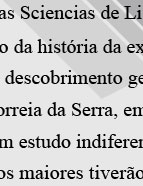

................................
According to Charles de Martens (Guide Diplomatique..., 1832), from a theoretical standpoint, Diplomacy "is based on more or less positive precepts and a precise, distinct object, that of regularising the relations that exist or should exist between various states, ordering and directing political negotiations." As for the term "diplomat," which entered political vocabulary in around 1830, it is absent from the final Act of the Congress of Vienna (1815) which, in regulating the protocol hierarchy governing international relations for the first time (Annex XVII), uses the expression Agens Diplomatiques and Employés Diplomatiques. Neither does it appear in the 4th edition of Morais Silva's Dictionary (1831), which merely distinguishes "the diplomatic art or science of understanding diplomas and ancient public documents" from "the science of political negotiators, and their etiquettes and ceremonies, everything pertaining to the occupation, styles, and uses of the Diplomatic Corps."
Just as diplomatic history follows the evolution of diplomacy itself, the development of diplomacy also follows the advances of history. While the systematisation of diplomatic relations began to be sketched in the Italian city-states of the 15th century, the Renaissance marked the idea of a new, global history, increasingly perfected thanks to the advances in method and criticism. However, the approach was dual and ambiguous. On one hand, there was a sense of the difference and relativity of civilisations; on the other, the pursuit of examples and lessons denied History itself by making it a magistra vitae.
In the 17th century, the Congress of Westphalia (1644-48) inaugurated the modern international system with the principle of state sovereignty, establishing a broad outline of international life, which remained until the second colonial shock in the 19th century. Diplomacy surpassed its habitual bilateral practice to become multilateral when it came to resolving major European conflicts, and embassies began to become more permanent. In his Testament Politique (1st ed., Amsterdam, 1688), Richelieu recommended continuous negotiations, whether open or secret, at all times and everywhere, even if there were no immediate benefits and despite future outcomes remaining obscure. History, in turn, found a method in the work of the Benedictine Jean Mabillon (De Re Diplomatica, 1681) based on the use of original documents (diplomas), distinguishing between the false and authentic pieces. The foundation of scientific diplomatics freed History for the pursuit of the truth and the deepening of its rules, based on the testimonies of events. However, despite the novelty of historical and philological criticism, the scholars of the 17th century had a merely material conception of truth. It was based on establishing texts and facts with the difficult aim of reconstructing them, whereby the historian faded behind the meticulously collected materials in the awareness of a historical reality not given, but rather the object of "inquiry".
